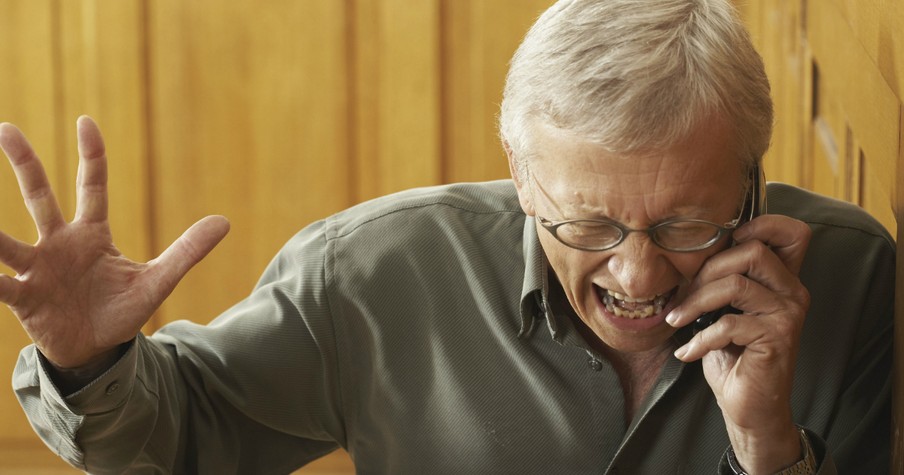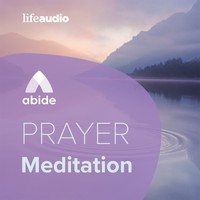
Christian Author Found Himself 'Hating God' During Wife's Descent Into Dementia
November 20, 2017

An Excerpt From "Walking Through Twilight"
“I hated God and told him so, repeatedly.”I am not sure what event in Becky’s decline enraged me more at God. Perhaps it was when I first visited her in a behavioral health unit. Maybe it was an incident that took place shortly after that. Becky had been transferred to another hospital and had been there for only a day or two. I called and asked how she was, “Oh, fine. She is resting after her first ECT.”
I screamed into the phone, “What? I did not give permission for that!”
Credit: ©Thinkstock/Jupiterimages My startled outrage seemed too explosive to be housed in my body. I roared, snorted, lashed out at two innocent objects in the house, and stormed off to the hospital. A bit of sanity slipped into my consciousness, and I stopped by a good friend’s house on the way to the hospital. After more yelling, crying, and lamenting the day of my birth (like Job), I settled down a bit and did what I had to do. ECT means electroconvulsive therapy. It is used to treat extreme depression. Becky and I had been briefed about this a few days earlier by a neurologist who droned on and on with almost no awareness that two shattered souls sat near him. I listened intently, but came to no decision on the treatment, which is nothing like what I saw in the film One Flew Over the Cuckoo’s Nest, forty years ago. It does not jolt patients into seizures and is very effective. It was right for Becky.But I did not give permission for it.
[/slide] Livid is too a tame a word for how I felt. I called three different doctors as soon as I could about this. They all concurred that ECT was a good idea. I then gave permission for continued treatment. I stopped yelling. I didn’t sue anyone. The ECT did help Becky come out of depression. It did nothing to abate her dementia. In fact, it revealed it. If Becky had depression mimicking dementia (which was her earlier diagnosis), the lifting of depression would have restored her cognitive abilities. But it did not. Credit: ©Thinkstock/Jupiterimages Part of coming out of my rage was pragmatic, not devotional. I had to decide what to do for the sake of my wife. I had to think clearly. But I did not think dearly of God. Didn’t he know I was already overloaded with fear, pain, and sorrow? Didn’t he care about my wife, who had been his redeemed child for so long? [rsnippet id="3" name="Article-Ad"]I hated God and told him so, repeatedly.
I hated myself for doing it, but I did it. But, pragmatically speaking, I needed God’s help more than at any other time in my fifty-seven years on earth. I knew rage was of the flesh, not of the Spirit. I never questioned God’s existence, only his goodness. I was bordering on misotheism—the “hatred of God.” Or maybe I had taken a guest pass into that thought-world. It seemed right, but felt awful. God must have been hearing me, but was not answering—not from a whirlwind or from anywhere else. However, I knew in my bones that God—this mysterious, seemingly heartless God—was my God and that he was my only hope. “I will be with you in trouble,” says he (Psalm 91:15). RELATED: Grandpa With Dementia Sings His Favorite Hymn I was no model of sanctity while thrashing about in this cauldron of white hot chaos. There was no “peace that passes understanding.” What passed understanding was the meaning of these uncharted events. I had let them steal most all of my affection for God. I had lost much of my fear of him as well. I was insolent before the Almighty. My foundations were shaken, but my responsibilities were intensified. The one thing I could not do was ignore God.I am a God-haunted man who knows God and is known by God.
Yet I have a young and brilliant friend who hates God and has no love for him whatsoever. He was raised by godly parents, whose hearts now break for him. I have spoken to and corresponded with this troubled soul. He wrote me one letter (not an email) that was six pages long, typed and single-spaced. He would like to condemn God to hell for the way his family suffered in serving God. I cannot crack his hatred with reason. I wait and pray, and understand some of his rage. Martin Luther offers me some solace for my tempestuous emotions. A man of courage, intellect, and deep piety, the Reformer was sometimes tempestuous. He reportedly said, “Love God? Sometimes I hate him!” Hating God (episodically) may have its benefits. But, please understand, I do not advise it. Nevertheless, you realize there is a God to be angry with, a God you cannot ignore. And you know God is not ignoring you. Your heart is revealed. No cover-up is possible. When you accuse God, your mood utterly differs from when you love God and sense his love. That sheer juxtaposition of moods may alert you to the fix you are in and drive you back to God in love. I assure you that love is better than hate. [/slide]I cannot leave Jesus permanently.
Although my trust waxes and wanes, unlike the routine of the tides, it is unpredictable. Unlike Peter, I have not denied Jesus before others, but like a fool I have told God off in the presence of another. When I am outraged at God, I try to think of God in Christ hanging on a cross for me. This sometimes brings me back to theological and psychological sanity if not sanctity. I must work with what I have and seek more as I walk through an ever-darkening twilight. The best way to hate God is on your knees (literally or in your heart), hoping that hate will be transformed into submissive love in the divine presence. Surely, this Godward accusation is better than indifference or apathy. As William Backus argued, most Christians have a “hidden rift with God,” which God wants to take away. But some of us have an open and bleeding and wide rift with God. Like the patriarch Jacob, we should wrestle with God until he blesses us. The blessing, however, always comes with a wound (Genesis 33:22-32), and we limp along until we rise again, never to limp again.—Adapted from chapter five, “The Temptation to Hate God” of Douglas Groothuis' book, "Walking In Twilight: A Wife's Illness -- A Philosopher's Lament"
Douglas felt compelled to write "Walking Through Twilight". He aims to bring hope and courage to others facing debilitating diseases like dementia. Because even in the darkness, even when we rage against God, He stays with us.
"I call this book 'Walking Through Twilight'. I chose twilight instead of darkness since I wrote this book while Becky is at home and I can still communicate with her," Douglas explains. " When this changes, it will be darkness, and I won’t write of that. However, Becky and I know that the darkness of the crucifixion is followed by the light of the resurrection. She will be raised immortal in God’s good time. Dawn follows darkness, but this comes at the price of agonized waiting. This book is a witness to that waiting."If you're interested in hearing more about Douglas and Becky's journey, you can purchase a copy of "Walking In Twilight" HERE. YOU MAY ALSO LIKE: Celebrity Opens Up About Her Mother’s Dementia Credit: Today
Today's Devotional
A Prayer to Be Courageous Like St. Patrick - Your Daily Prayer - March 17
Although raised in a Christian home, Patrick never made a decision to follow Christ until after he was sold into slavery. While shepherding in the fields, he began talking with God and soon surrendered his life to Christ.
Top Artists
Top Music Videos

chris rupp Chris Rupp’s Beautiful A Cappella Cover of 'I Will Be Here'

Anne Wilson Anne Wilson Captivates with Heartfelt 'My Jesus' Live Performance

GodTube Music Anne Wilson Talks Sharing Her Faith at Secular Country Concerts

Kristian Stanfill Kristian Stanfill - Come To Jesus

Housefires 🔥 Housefires - Peace Of God
Blogs
At GodTube, you’ll find daily inspirational videos to lift your spirits and encourage you in your walk with God. Popular videos include worship music from your favorite Christian artists, cute videos with adorable kids and animals, hilarious videos from Christian comedians, user-uploaded videos, and clean viral videos to brighten your day.









